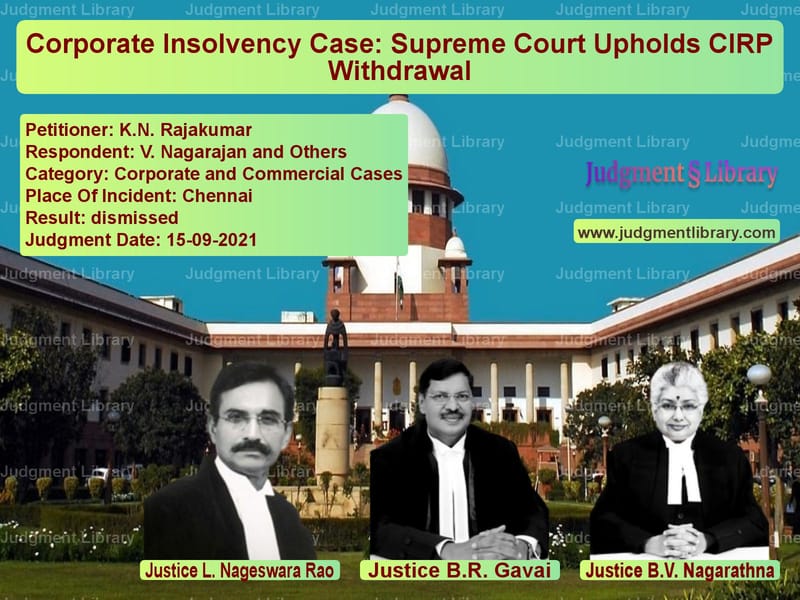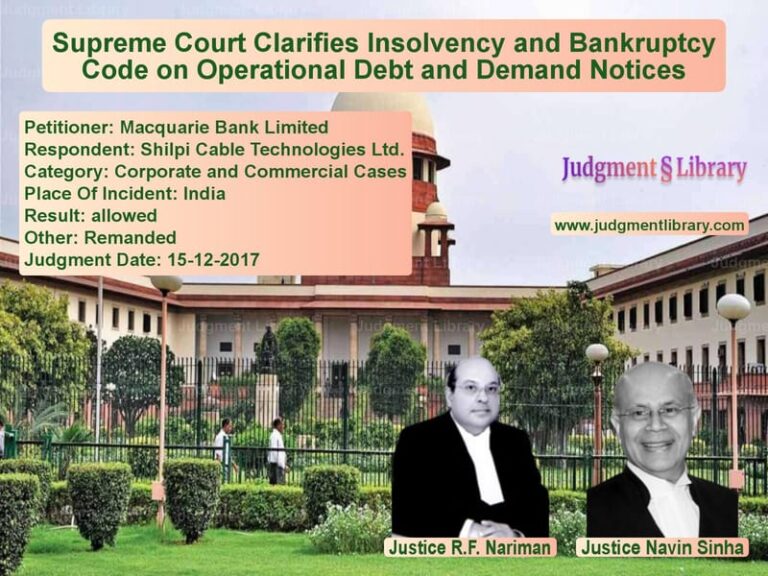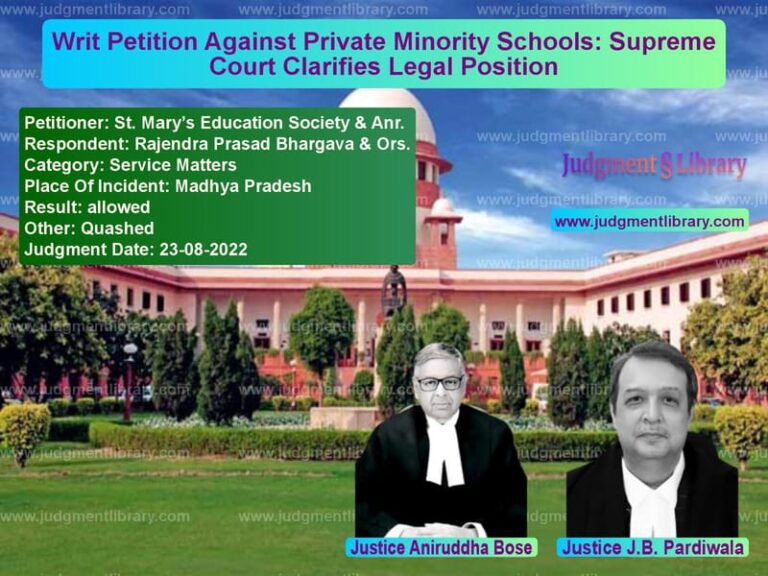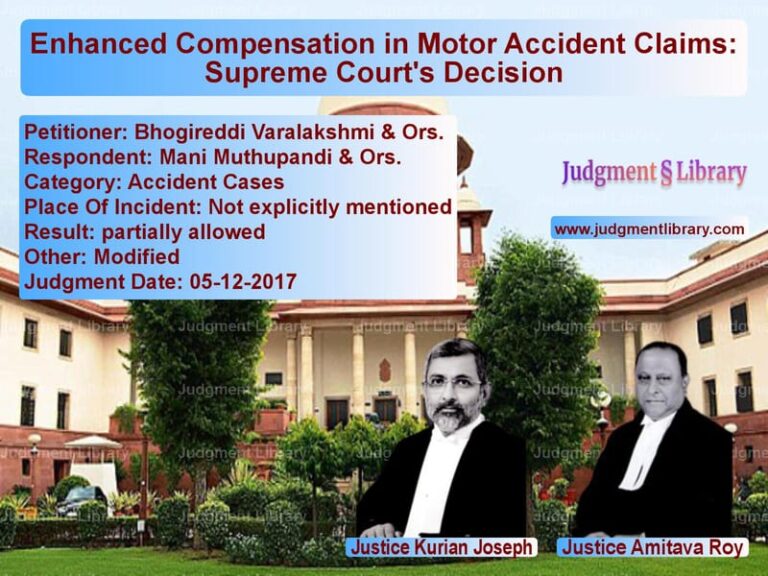Corporate Insolvency Case: Supreme Court Upholds CIRP Withdrawal
The present case revolves around the corporate insolvency resolution process (CIRP) concerning M/s Aruna Hotels Ltd., a corporate debtor that faced financial difficulties. The case primarily involves two appeals—one filed by K.N. Rajakumar, a suspended director of the corporate debtor, and the other by D. Ramjee, a former employee of the corporate debtor, contesting the decisions made by the National Company Law Tribunal (NCLT) and the National Company Law Appellate Tribunal (NCLAT).
Background of the Case
M/s Aruna Hotels Ltd. was incorporated in 1960 and initially had multiple business ventures, including a sugar unit, distillery, flour mill, chemical unit, finance company, and a four-star hotel in Chennai. However, over time, the company retained only its hotel business, which had been non-operational for over seven years.
One of the appellants, D. Ramjee, had been an employee of the corporate debtor since 1964. He officially retired in 2013 but claimed that the company had outstanding salary dues amounting to Rs. 2.60 crore. Due to non-payment, he initiated corporate insolvency proceedings under Section 9 of the Insolvency and Bankruptcy Code (IBC) before the NCLT, which admitted the application and appointed a Resolution Professional (RP). However, the corporate debtor challenged this decision before the NCLAT, which set aside the NCLT’s order on the ground that the company had assured payment of outstanding salary dues.
Read also: https://judgmentlibrary.com/tenant-rights-vs-secured-creditors-supreme-court-rules-on-sarfaesi-act/
Proceedings and Appeals
Following the NCLAT’s decision, the corporate debtor attempted to settle outstanding claims with financial creditors and sought withdrawal of the CIRP under Section 12A of the IBC. Meanwhile, another former employee, N. Subramanian, also initiated a CIRP application, which was admitted by the NCLT but later set aside by the NCLAT. This led to further legal challenges before the Supreme Court.
Key Legal Issues
The Supreme Court examined the following critical issues:
- Whether the CoC (Committee of Creditors) composition should be updated based on claims.
- Whether the corporate debtor’s financial restructuring was sufficient to withdraw CIRP.
- The legitimacy of the corporate debtor’s claims regarding settlements with financial creditors.
- Whether a former employee, such as D. Ramjee, had legal standing to challenge the CoC resolutions.
Arguments by the Parties
Arguments by D. Ramjee
D. Ramjee argued that under IBC provisions, the claims of all creditors should be updated periodically. He contended that since the corporate debtor had settled with financial creditors, the CoC should have included operational creditors like him. He also challenged the NCLT’s decision to permit the withdrawal of CIRP, arguing that it disregarded the interests of operational creditors.
Arguments by K.N. Rajakumar
The suspended director of the corporate debtor, K.N. Rajakumar, opposed the claims made by Ramjee. He stated that the company had settled dues amounting to Rs. 46.31 crore with financial creditors, making the CIRP unnecessary. He also argued that since the CIRP initiated by Ramjee had been set aside by the NCLAT, he had no standing to challenge the withdrawal.
Supreme Court’s Analysis and Judgment
The Supreme Court upheld the NCLT’s decision permitting the withdrawal of CIRP under Section 12A of the IBC. The Court emphasized that:
- The CIRP process is primarily aimed at reviving the corporate debtor rather than leading to liquidation.
- The withdrawal was approved with the requisite 90% voting share of the CoC, fulfilling the legal criteria under Section 12A of the IBC.
- Since Ramjee had already received a payment of Rs. 18.5 lakh as part of the settlement, he had no further claims in the insolvency process.
- Operational creditors do not automatically have rights equivalent to financial creditors in CoC voting decisions.
The Court relied on the judgment in Ghanashyam Mishra and Sons Private Limited v. Edelweiss Asset Reconstruction Company Limited, which stated that the objective of the IBC is to ensure the revival of corporate debtors as a going concern.
With this reasoning, the Supreme Court dismissed Ramjee’s appeal and allowed Rajakumar’s appeal to be withdrawn.
Conclusion
The ruling reinforces the principle that CIRP should be aimed at reviving financially distressed companies rather than pushing them into liquidation. The Court also clarified that withdrawal of CIRP is permissible if creditors approve it with the necessary majority. The decision further highlights that operational creditors do not automatically have the same decision-making authority as financial creditors in the insolvency process.
Read also: https://judgmentlibrary.com/corporate-debt-and-insolvency-understanding-the-landmark-judgment/
Petitioner Name: K.N. Rajakumar.Respondent Name: V. Nagarajan and Others.Judgment By: Justice L. Nageswara Rao, Justice B.R. Gavai, Justice B.V. Nagarathna.Place Of Incident: Chennai.Judgment Date: 15-09-2021.
Don’t miss out on the full details! Download the complete judgment in PDF format below and gain valuable insights instantly!
Download Judgment: k.n.-rajakumar-vs-v.-nagarajan-and-oth-supreme-court-of-india-judgment-dated-15-09-2021.pdf
Directly Download Judgment: Directly download this Judgment
See all petitions in Bankruptcy and Insolvency
See all petitions in Corporate Compliance
See all petitions in Judgment by L. Nageswara Rao
See all petitions in Judgment by B R Gavai
See all petitions in Judgment by B.V. Nagarathna
See all petitions in dismissed
See all petitions in supreme court of India judgments September 2021
See all petitions in 2021 judgments
See all posts in Corporate and Commercial Cases Category
See all allowed petitions in Corporate and Commercial Cases Category
See all Dismissed petitions in Corporate and Commercial Cases Category
See all partially allowed petitions in Corporate and Commercial Cases Category







